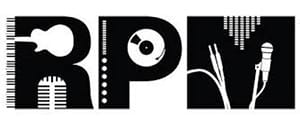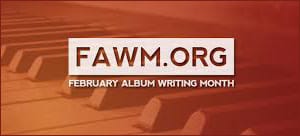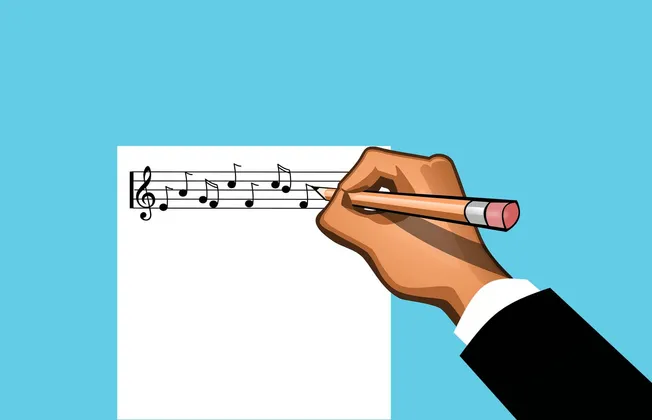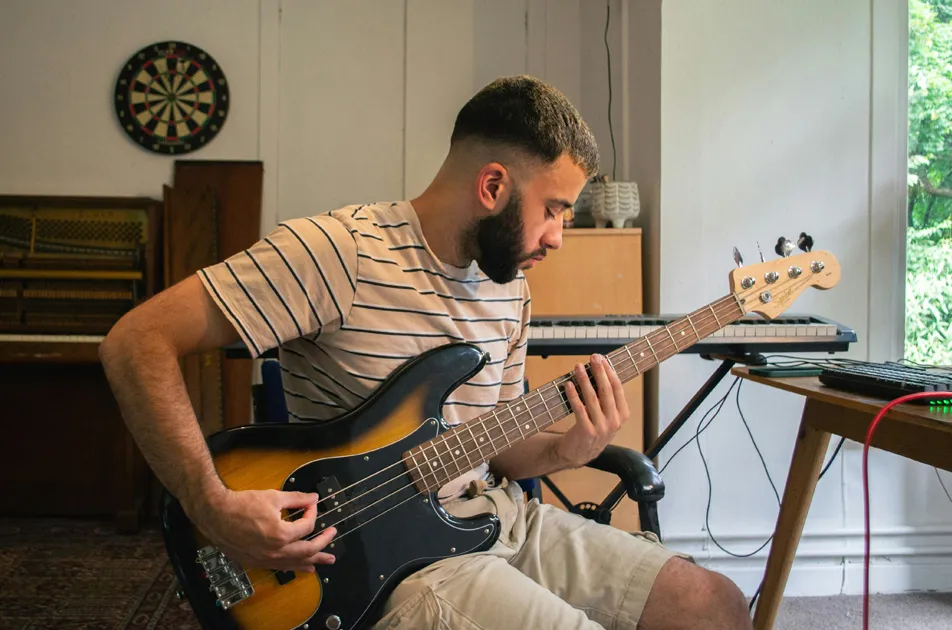As we crawl out of the holiday fog to greet the new year, why not sign up for the RPM Challenge or February Album Writing Month and produce an entire album of new music in 28 days?
By Randy Chertkow and Jason Feehan from the Disc Makers Blog
It’s cold outside and we’re not quite back to our regularly scheduled gigging routine, so why not take this time to finish up your song ideas, boot up your DAW (or or head to your local recording studio), and produce an album?
Maybe you need a bit of motivation, so how’s this: Starting this February 1st, challenge yourself to record an entire album’s worth of new, original music by March 1st.
Sound impossible? It’s not — and one of the most motivating things in life is a deadline. But even more motivating is having other musicians you can lean on who are trying to achieve the same musical goal. Pushing yourself to be creative in such a compressed time frame is good for your musical output — and we’ve got tips to help you achieve it.
Sign up now and commit to this creative challenge. How? By joining one of two free February music challenges:

Record Production Month Challenge (RPM)

February Album Writing Month (FAWM)
Each year, we push our musician friends and all our students to attempt one of these two challenges. Both RPM and FAWM are modeled after the highly successful National Novel Writing Month, which challenges authors to commit to writing a 50,000-word manuscript during the month of November. Both RPM and FAWM challenge you to record an album’s worth of material during the month of February. RPM challenges you to finish 10 songs or 35 minutes of music, while FAWM sets your goal at 14 songs. Either way, they both achieve the same result: you produce an album in 28 days! These are both motivational challenges, not contests or battle-of-the-bands. You “win” by finishing and creating new, original music.
So, how does an album challenge work?
Why does an album challenge work to spark creativity for so many musicians? Because of a little thing called “Parkinson’s Law,” which states that “work expands to fill the time available to complete it.” This means that if you give yourself three months to come up with 10 songs, it will end up taking you three months to complete the task. However, that extra time probably won’t improve the quality of what you create. Studies have shown that most of the time spent on a given project is usually wasted on procrastination, distractions, over-planning, and stress. In fact, other studies have shown that imposing a constraint on creativity — whether you limit the technology, tools, or the time you take (deadlines!) — can actually enhance what you create and the quality of ideas.
Because the 28-day deadline is much shorter than what it usually takes to create an album, it forces you to push off the distractions and procrastination and focus on the key essentials — songwriting, recording, and mixing — since you have such limited time.
Here are three additional reasons why you should take on an album challenge this month:
- Create new material. The idea with any music challenge isn’t to make something perfect! Get that idea out of your head and use the 28 days to complete a first draft. Once you complete the challenge, that can be the start of a process you can finalize once the draft is done. Although you can share it with the other musicians you connected with at the challenge sites, you don’t have to release it to the greater public “as is.” Instead, you can put more production time into it afterward. Once you have 10-14 new songs, you’ll be in a great position to pick which tracks to continue to work on, revise, add to, and then release into the world throughout the year.
- Network with other musicians. One of the best things about these challenges is knowing you’re not alone. Throughout February, the RPM and FAWM websites and forums are buzzing with musicians talking gear, exchanging recording and songwriting tips, and keeping each other motivated as the clock ticks to midnight on March 1st. It’s a great place to network and generate new opportunities for one another. And then, once it’s done, the connection continues with listening parties online and in cities around the world.
- Generate exposure. Participating in the challenge can also generate publicity and exposure. The music you create can get included in jukeboxes showcasing RPM and FAWM artists, which can get you new fans. Plus, RPM and FAWM often work with the media to highlight the musicians taking part. For instance, the RPM organization usually promotes the event to radio and media outlets, including National Public Radio (NPR), which chooses its favorite songs and plays them on the air.
A few years ago, our own attempt at the RPM Challenge ended up getting NPR coverage. And, once we put the finishing touches on our album, Sham Rock, it was even nominated for a couple of different “Best Irish Album” awards. Not bad for just rolling up our sleeves, diving into the challenge, and seeing what might come out of it.
Schedule your four weeks and block out your work
Seriously, why not channel your frustrations from these past two years into something positive, like bringing some new music into the world? Focusing on a four-week project like this can not only get you out of any funk you may be in as we round the corner on another year of social distancing, but it’ll keep your mind focused on something positive: creating new music. You only have four weeks, so one way to make the best use of your time is to break up the weeks by album production tasks. For example, week one could be reserved for songwriting — song topics, lyrics, initial demos, etc. You may even want to pick a theme for the album to help structure and guide what you’re creating.
The goal would be that, by the end of week one, you’ll have rough demos for all the songs you’ll be recording and mixing during the rest of the month. Weeks two and three should target recording, with week four focused on mixing. Of course, that’s the plan, but you’ll want to be flexible. When we took on the RPM Challenge, we came up with songs late in the month that were perfect for the album, and we found a way to fit them in.
One note: the rules of both contests state you need to submit an album cover along with the music, so you’ll either want to work on that bit by bit through the month or reserve the last few days to create the image.
Are you ready to dive in? If so, here are some tips for songwriting and music production to make the best of the 28-day challenge.
Produce activities and tasks in batches
This tip will help your music production as well as your efficiency throughout the month as you focus on album creation. Batching is the act of lumping related tasks together so you can finish them all at once. Think about how you do your laundry: you don’t wash each article one at a time; you do a whole batch based on color or fabric type. For our band, which includes a horn section, we set aside time to record all the bass parts or all the horn parts on one weekend day. By doing this, the band members didn’t have to come into the studio 10 times. They came in once and powered through all 10 songs, saving a ton of time.
A second way to use the batching technique as you’re working on your album is to bundle up non-album-production activities, like answering emails, posting on social media, or hitting the RPM or FAWM boards. Otherwise, you can scatter your time, lose focus, and kill your creative flow and production output.
Shut up your inner critic
As we said in “You aren’t qualified to judge your music,” you need to ignore your internal critic when songwriting — especially when working within a tight deadline like RPM and FAWM. Critiquing yourself during the creative process is like driving with the parking brake on. Stay in the flow and run with what you come up with. You can always edit and refine what you created later. Remember, what you’re creating is a first draft to build on and release to the greater public later in the year. Your job now is simply to create new music and produce a solid album for the RPM or FAWM audience.
— — —
Are you up for the challenge? You can start coming up with ideas for a theme for your album and a plan now so you’re ready to go once the clock strikes midnight on February 1st.





